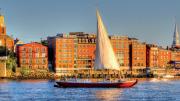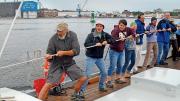Gundalows are wide, flat-bottomed, wooden boats that first appeared in the mid 1600s on the Piscataqua River, which separates Portsmouth, New Hampshire, from Maine. Settlers built them to transport harvested crops, furs, dried fish, and lumber to the Atlantic Ocean, following the rhythm of the tides. (Fed by six other rivers that run through inland towns such as Exeter, Durham, and Dover, the Piscataqua is the second-fastest-flowing navigable waterway in the country after the Columbia River in the Pacific Northwest.)
For more than 250 years, until supplanted by the more reliable, year-round capability of trains, these handcrafted, barge-like boats were unique to the region—and instrumental in its growth, says Molly Bolster, executive director of the Gundalow Company.
The nonprofit organization offers educational and recreational river tours from Prescott Park in downtown Portsmouth on the Piscataqua, the gundalow replica it launched in 2012. Most of the trips last 90 minutes and run down to the mouth of the river, past the Portsmouth Naval Shipyard and the long-vacant federal prison known as “the castle,” to just beyond the U.S. Coast Guard station at the tip of New Castle, New Hampshire—“within sight of the Isles of Shoals,” Bolster says, “at least on a clear day.”
There are sunset sails with wine and cheese; cruises featuring shanty singers and lectures on maritime and natural history; and field trips for students learning about ecology. An occasional inland foray heads upriver into Great Bay, a national estuarine research reserve that is home to flora and fauna partial to brackishness. “The Piscataqua is a platform, literally and figuratively, for thinking about the human impact on the estuary and how we can be stewards of the land and the river,” says Bolster. “The idea is that if people experience it, they will take care of it.”
The early gundalows (possibly named for the Venetian “gondola,” Bolster says) were powered by poles and long sweeps (oars), but by the 1800s the boats resembled the Piscataqua, which has a full deck, a cabin, and a lateen sail easily lowered to pass under bridges. By then, too, they were carrying commercial loads of up to 50 tons: raw cotton and spices were brought in, while fresh produce, fish, oysters, salt-marsh hay, coal, and “finished goods,” such as bricks, granite, and cordwood, Bolster says, were transferred out to ocean-worthy schooners bound for burgeoning metropolises like Boston.
The last known commercial gundalow was the Fanny M, built and captained by Edward H. Adams and launched in 1886. Riding on the Piscataqua, it’s easy to see why Adams, who died in 1950, was a pioneering proponent of environmental health even decades after the Fanny M was beached, around 1910. The boat sits low in the water, offering little to buffer passengers from freewheeling currents, the wind and sun, fresh salt spray, and, Bolster says, a sense of never-ending sky as they travel on “gundalow time.”










